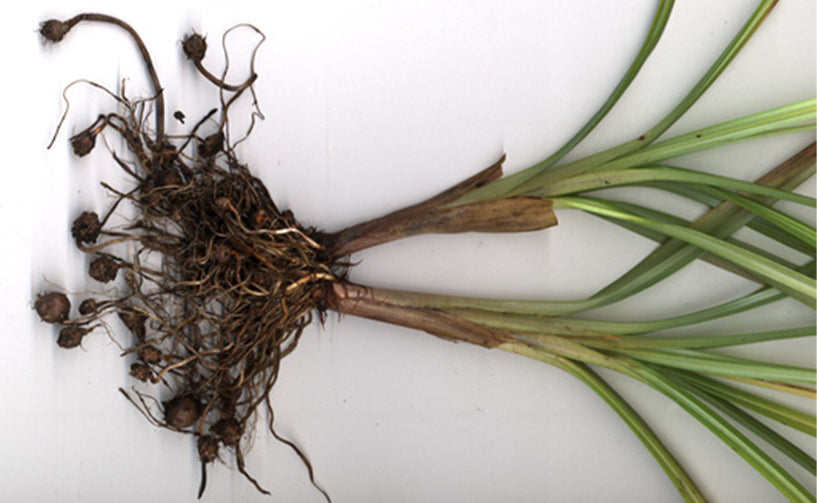Motha a.k.a. Cyperus Rotundus is a plant from the Cyperaceae family. It is grown in parts of Africa, Europe and Asia. In India, it is found all through the temperate and tropical regions.
Cyperus is a perennial plant which grows up to the height of 140 cm. It has flower stems with a triangular cross section. Flowers consists of three stamens and a three-stigma carpel. Motha fruit is more like an achene, a fruit that doesn’t release the seed.
Motha is popular as nutgrass as it resembles grass in appearance and has tuberous roots which look like nuts. In Sanskrit it is called Musta, Jalada, Ambhoda, Ghana or Mustak.
In Ayurveda, it is featured as a medicinal herb due to its long-lasting effects on several health problems especially those affecting women. It is bitter and astringent, has cold potency and works on balancing Pitta and Kapha doshas in the human body. Traditionally, the dried roots of this herb have been known for their astringent, diaphoretic, analgesic and desiccant properties.
The leaves and roots are commonly used due to their edible nature and nutritional value. Motha rhizome plays the role of an important constituent of many medicines and supplements. The essential oil extracted from rhizomes is widely used in preparing medicines due to its anti-inflammatory properties.
Benefits of Motha
-
Helpful in Managing Diabetes: Nutgrass is essentially helpful in reducing diabetes. It has an amazing power to treat obesity which is one of the prominent causes of diabetes. This plant has served as a traditional remedy for diabetes since ages. The hyperglycaemic properties make it useful for the treatment of diabetic patien.
-
Analgesic Effect: This herb has been the topic of many researches and has been found to have an analgesic effect. It is known for reducing abdominal contractions and pain.
-
Reduces Inflammation: Motha plant is known for its anti-inflammatory properties. It helps in treating many inflammatory body issues and reduces pain caused by inflammation.
-
Anti-Diarrhoea Effect: Diarrhoea can be treated with the use of roots of motha. Traditionally, the roots of this herb were boiled in milk and provided to patients suffering from mucous and pain during diarrhoea. This herb is used in preparing medicines for preventing and stopping diarrhoea, dysentery and other stomach disorders. Its anti-microbial property works on bad bacteria and controls the harmful effects.
-
Heals Wounds: Wounds tend to damage skin tissues which need proper healing. Motha has great healing properties that help in clotting blood and fastens the healing process.
-
Diuretic: People face problems in passing urine due to renal infections and renal calculi. Nutgrass has diuretic properties that help in easy passage of urine and breaking down of renal calculi. It finds a place in many compositions for renal infections.
- Acts as an Anti-Depressant: Depression is a disorder characterised by mood swings, low self-esteem and lack of interest. Motha plant has anti-depressant qualities that make it an appropriate herb for patients suffering from depression and mood fluctuations






